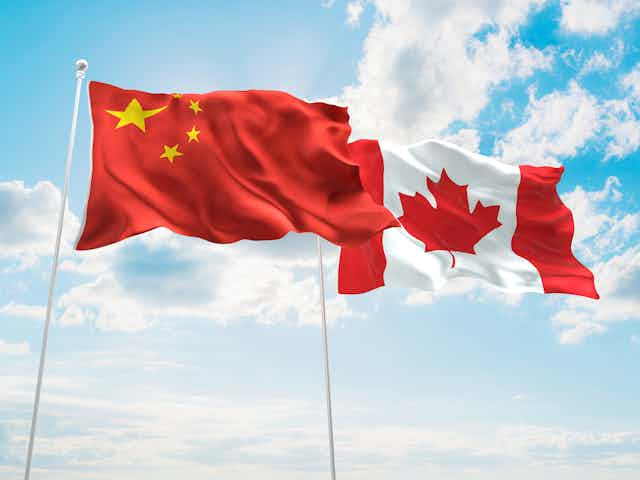As Canadians digest a stream of news and punditry about NAFTA renegotiations, there’s another trade relationship — possibly more consequential for our future — that’s being forged in comparative silence.
The second China-Canada Foreign Ministers Dialogue was recently held in Beijing, with Canada’s Chrystia Freeland sitting down with her counterpart Wang Yi to “explore ways to further consolidate Canada-China ties,” as Xinhua news agency put it. Upcoming Canada-China trade talks topped the agenda.
But despite anxiety in Canada over China’s demands in any new deal, and what’s at stake should Canada dramatically increase our trade with the Chinese, we know little about what was even discussed. Freeland flew home with no post-meeting news conference. No communiqué was issued.
Given the shocking spectacle that crowned last year’s edition of this dialogue when Wang arrogantly berated a Canadian journalist who asked about China’s human rights record, many might suspect the secrecy is Beijing’s precondition to any further talks. Based on my past experience as a counsellor at the Canadian embassy in Beijing, I find this quite likely.
Canada a ‘friend of China?’
When John McCallum, now Canada’s ambassador to China, was a federal cabinet minister, he was a champion of expanding connections between Canada and China, and doing it on Chinese terms. McCallum, who was at the recent meetings with Freeland, evidently buys in to Beijing’s “friend of China” platitude.
He apparently accepts the Chinese Foreign Ministry line that China is the future, and sustaining Canada’s economic growth means Ottawa should acquiesce to Beijing’s “distinctive” domestic governance and strategic aspirations abroad.
As Justin Trudeau himself said in 2012: “We deceive ourselves by thinking that trade with Asia can be squeezed into the 20th-century mould. China, for one, sets its own rules and will continue to do so because it can. China has a game plan. There is nothing inherently sinister about that.”
McCallum, the cabinet minister, likely would have agreed, even if turning a blind eye from human rights abuse in China is tacit consent of arbitrary imprisonment, torture, suffering and death.
But McCallum, the ambassador, is subordinate to his former junior cabinet colleague Freeland, who is thought to have a more textured and sophisticated grasp of Communist regimes and how to promote Canadian interests in discussions with the Chinese.
Chinese media had details
Her priorities for relations with China might not sit well with McCallum, and there could be tensions between them that Beijing will try to exploit to further its own goals with Canada.
If Ottawa was reticent to reveal what was said at the meeting, the Chinese media was more forthcoming. The China Daily reported that Wang said “China and Canada should maintain high-level exchanges and exchanges at other various levels, promote the construction of a China-Canada free trade zone and expand anti-corruption and law enforcement cooperation.”

Canada has a problem with this last point, which implies extraditing Chinese nationals from Canada despite our concerns over China’s lack of due process of law and extensive use of the death penalty.
Apparently driven by the Prime Minister’s Office, Canada continues to move to create what Wang described as “a new golden time” of bilateral relations.
Seasoned China-watchers wonder if the PMO told Freeland to avoid engaging her Chinese interlocutors on issues of concern to the Canadian public, such as the disappearance of Liu Xia, the widow of the Nobel laureate Liu Xiaobo; or the ongoing (17 months and counting) imprisonment of B.C. wine exporter John Chang over what China calls a “customs valuation dispute” but which may really be about refusing demands for payoffs.
Canadians troubled by Chinese human rights record
Canadians also deplore China’s violent persecution of ethnic minorities, people of faith and the lawyers who seek to defend them under Chinese law.
Opinion polls, along with Ottawa’s own consultations with Canadians, suggest public alarm over Chinese trade practices, forced transfer of intellectual property and Beijing’s growing influence in Canada.
There’s also deep concern about precedents that include Chinese enterprises owning Canada’s natural resource enterprises, and Beijing’s demand to use imported Chinese labour on Chinese-directed projects within Canada.
Of course, despite any public apprehension, the PMO is under pressure from Canada’s China-related major corporations to press ahead with free trade anyway.
From her past writings and statements, we know that Freeland is unlikely to support unconditional expansion of relations with China at the cost of sacrifice of the Canadian values she has so strongly upheld.
But her silence following her first trip to China as foreign affairs minister is both deafening and troubling.

